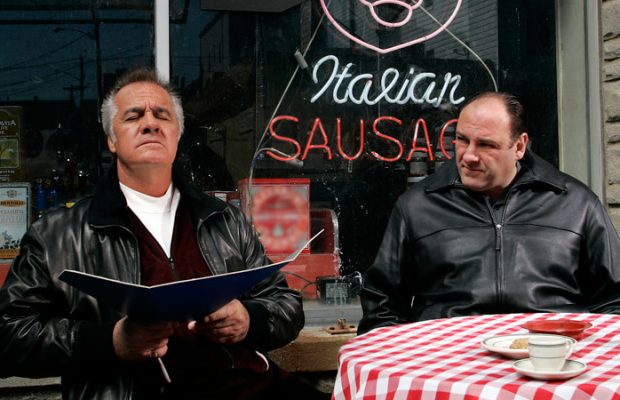The Sopranos Italian Slang
Hi Chris, Good day and thanks for your question. The term moolinyan is very rarely used. Its more commonly used in the TV show, The Sopranos. The common term is Moolie, which is shortened from melanzana, which means eggplant in Italian. Another term is Moolignon, which is the combination of moolie and hooligan.
By: Dina Di Maio, ISDA Contributor
Derogatory slang term for a black person. A Sicilian word, derived from the Italian 'melanzane' (English: eggplant). Common among Italian-Americans, particularly of Sicilian origin, as a slur for African-Americans. Popularized in American culture by television drama series 'The Sopranos'. HBO shares a hilarious visual dictionary for 'The Sopranos.' HBO gave fans of the hit television series The Sopranos a special treat on Wednesday by posting a funny, 10-minute visual dictionary of. The word is based on the Italian word pisciare which means to urinate. However piscadu is a slang word coined by Italian-Americans. It is not an Italian word. Recall the episode in season 2 when Paulie is in Naples and he asks a waiter where the piscadu is and the waiter gives him a blank stare not understanding what Paulie was saying.
This week, an article appeared in northjersey.com, part of the USA Today Network, that begins “You may be speaking Soprano–and not even know it.” The article talks about HBO’s show The Sopranosand how it used “Italian-American food slang words” that only New Yorkers know. The article lists a number of words such as “goomah” and “goomba” and their definitions.
The words included in this list are all words from the Neapolitan dialect, and most likely other Southern Italian dialects as well. A “goomah” is a comare, a godmother at your baptism or confirmation, two sacraments in the Roman Catholic religion. (A comare can also be a man’s mistress.) A “goomba” is a compare, a godfather, the male equivalent. These words are also used to describe well-loved people who are not relatives.
They are pronounced like “goomah” and “goomba” because in dialects of Southern Italy, “c” is pronounced like a hard “g,” “o” can sound like “u,” “p” can sound like “b,” and “r” can sound like “d” or be so soft as to be left off like many vowels are.
:max_bytes(150000):strip_icc()/GettyImages-113744060-5813604e3df78c2c73a5fc50.jpg)

In general, there is much misinformation in the media regarding the culture of Italian Americans, and once you become aware of it, you’ll start to pick up on it in other areas. In fact, that’s just what happened to me when I began to write my book, Authentic Italian: The Real Story of Italy’s Food and Its People.
What began as research into the history of our foodways opened my eyes to the ways in which Italian-American culture has been misinterpreted or deliberately co-opted by a whole range of entities, the media not the least among that number. The article cited above is only the tiniest tip of that iceberg.
In my book, I dispel much of this misinformation, including dialects and languages of Southern Italy and Italian Americans. As you may already be aware, the majority of Italian immigrants to this country 100 years ago were from Southern Italy, so the languages they spoke were ones from various regions of Southern Italy. For example, Neapolitan and Sicilian. (There were also Northern Italian immigrants who spoke their dialects too.
According to the documentary, Tra Ponente e Levante, in Santa Cruz, California, the Genoese dialect is still spoken. And the Italian Waldensians in Valdese, North Carolina, whom I’ve written about a number of times in the past 16 years, spoke a dialect from the Piedmont region of Italy called Patois.

Also, there were ancient peoples in Southern Italy before the Romans, and they had their own languages. Oscan is a dead language that was spoken by people in the Naples area and by the ancient Samnites in Southern Italy. When the Romans conquered the region, Latin became the standard language. It would be interesting to research what aspects of these native languages survived to present day, especially in Basilicata where people lived in stone caves called Sassi until as recently as after World War II.
Through the centuries, Southern Italy was influenced by Spain, France, the Arab world and Greece, as different invaders and traders came through those areas. Therefore, Southern Italian dialects and languages have all these cultural influences.

Like our foodways, our social customs, and our belief systems, the languages and dialects of Southern Italy were brought to the United States by our grandparents and great-grandparents, and they were handed down through the generations. They are not made-up words invented by Italian Americans or American TV, and they were spoken across the country, not only in the New York area.

The Sopranos Italian Slang Term
Dina Di Maio is a lawyer and writer. Her book, Authentic Italian: The Real Story of Italy’s Food and Its People, was published in March 2018. She encourages you to get in touch on Twitter.